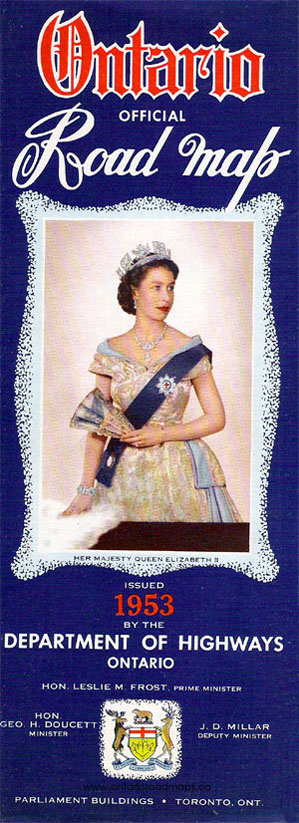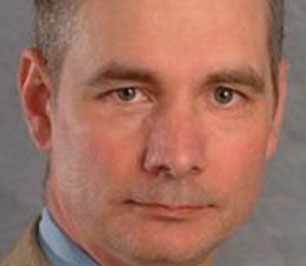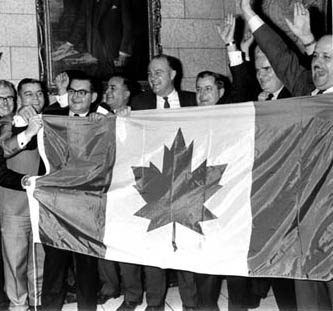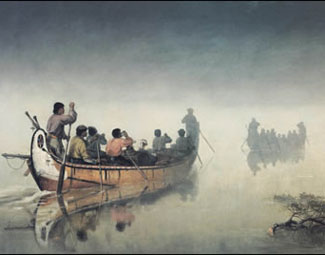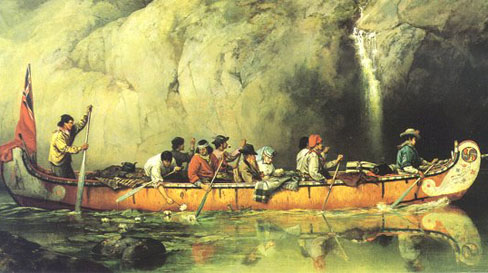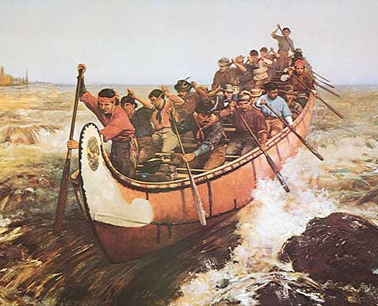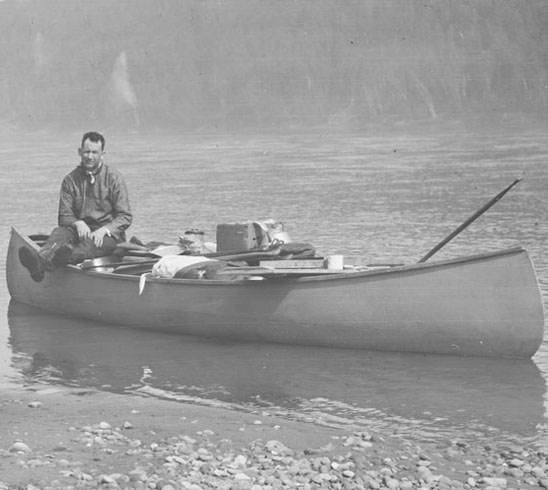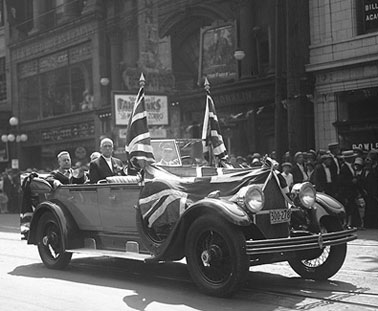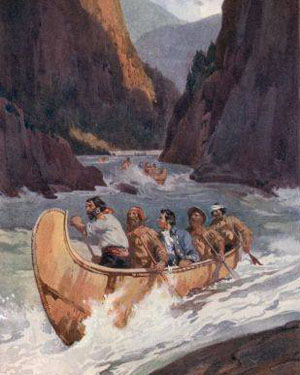Just what was PM Harper thinking .. how about “Canadian Navy, Air Force Name Change Divides NDP Caucus”?
Aug 21st, 2011 | By Randall White | Category: Canadian RepublicI agree that over the mid to long term future, Stephen Harper’s “abject colonial” restoration of the “‘royal’ designation to Canada’s air force and navy” last week is almost certainly going to work to the advantage of those of us who see a Canadian republic as our ultimate rational democratic destiny in the true north, strong and free.
(Still a so-called “Westminster” parliamentary republic, of course – probably following some blending of the mid 20th century precedents set by such other former self-governing British dominions as India and Ireland. Canadian republicans admire the intermittently dysfunctional US presidential-congressional system of government even less than “the six remaining members of the Monarchist League.” )
Gerry Nicholls, the same former Harper think-tank colleague who was telling us late this past June that the new Conservative majority prime minister “previously wasn’t a staunch monarchist, but … values it as a conservative symbol,” is now reporting that in restoring the retrogressive royal designation to Canada’s air force and navy PM Harper is just trying “to stick it to former prime minister Pierre Trudeau.”
Mr. Nicholls goes on: “like many staunch conservatives, Harper views Trudeau as the ‘Great Satan’ … Not only did Trudeau move Canada dramatically to the left, but he also held many of the country’s traditions in open contempt.”
A big part of Mr. Harper’s mid to long term trouble here, no doubt, is that this over-charged ideological caricature of Canada’s past is very close to radically remote from the plain truth.
Overstatement is seldom a Canadian temptation, east and even west. And Pierre Trudeau hardly moved “Canada dramatically to the left.” The federal health care and pension systems predate his arrival in the prime minister’s office. His father was a pioneer of the emerging 20th century French Canadian business class in Quebec. And as the Winnipeg wit Larry Zolf memorably explained, in office in Ottawa Trudeau went “from philosopher king to Mackenzie King.”
Moreover, it wasn’t Pierre Trudeau who brought in such 19th century imperial tradition-changing reforms as the first independent Canadian Citizenship Act of 1947, or the independent Canadian flag of 1965. It was Mackenzie King himself and Lester Pearson.
(And the colony-to-nation Liberals started their long journey to “the natural governing party of Canada” with Wilfrid Laurier – the first French Canadian prime minister of the modern confederation of 1867, which arose in the wake of the American Civil War – as long ago as 1896!)
A new deep heritage debate : British monarchy vs. multicultural fur trade in northern wilderness
In some similar vein, we emerging Canadian republicans of the early 21st century have every reason to be grateful to what the editors of this excellent website described this past February as “Minerva’s owl spreads its wings on Stephen Harper’s last gasp of the British monarchy in Canada.” The new old strategic royal romantic in the prime minister’s office of 2011 has at last given us something to openly organize and fight against.
In the more recent past one nagging problem for those of us who really do want to abolish what remains of the old royalism in the northern North American wilderness is that, for several decades now, its practical existence has been so monumentally subtle and near-invisible. It has been a kind of ghost from a simpler if also obsolete (and colonial) past, hanging apparently harmlessly (or so it seems) over an increasingly complicated present.
This has made the sunset of the strange romance of the British monarchy in Canada frequently hard to find, let alone defeat in a fit of belated political maturity. And that has been one of its quiet strengths.
(Oh, and btw: the monarchist-propaganda contention that, under the present Canadian constitutional amending formula, it is impossible to get the required approval of all 10 provincial legislatures for anything, let alone abolishing the British monarchy, was disproved almost 20 years ago, when all 10 provincial legislatures did agree on the Charlottetown Accord. It was the people of Canada and Quebec, in two referendums, who put an end to this much-needed if still too imperfect effort at Canadian post-colonial constitutional renovation – a still-needed further refinement, as it were, of Pierre Trudeau’s Constitution Act, 1982.)
At the same time, at this point in his career there can be no doubt as well that Stephen Harper is a shrewd and clever short-term political strategist. In office he has made his own journey “from philosopher king to Mackenzie King.” And he may even believe that “in the long run we’ll all be dead” (along with John Maynard Keynes, whose quite un-conservative economic advice Mr. Harper also appears prepared to follow, when it makes “pragmatic” sense?).
PM Harper, that is to say, is going to lose the longer term battle over the British monarchy in Canada. This is written in the only real Canadian DNA we have. (Trudeau himself no doubt was a too imperfect guide to all this: for one somewhat more ancient example, see Harold Innis’s still-in-print classic of 1930, The Fur Trade in Canada: An Introduction to Canadian Economic History.)
But why should PM Harper care? He ”previously wasn’t a staunch monarchist,” as Gerry Nicholls has explained. He is just using (or trying to) the last gasps of the British monarchy in Canada for shorter-term conservative and especially still narrower Conservative partisan political goals.
Whatever else, it does seem very likely indeed that when all 10 provinces and the federal parliament finally do agree (probably on this and other matters – vaguely reminiscent of the failed Charlottetown Accord of 1992?), and the British monarchy in Canada does come to an absolute and officially definitive end, Stephen Harper will no longer be prime minister of the true north strong and free. And, with some five years of experience now under the collective belts of we the diverse Canadian people, in the very end being and continuing to be prime minister does seem the only thing in which Stephen Harper is altogether unambiguously and seriously interested.
Old Orange storm troopers of the Tories have also had some friends in CCF-NDP
From this angle, a headline in this past week’s Huffington Post Canada may help explain what the otherwise somewhat bizarre story of the new old RCN and RCAF is really all about : “Canadian Navy, Air Force Name Change Divides NDP Caucus.”
Althia Raj of the Post Canada has reported in more detail: “The federal NDP caucus is split over the Conservative government’s decision to return a royal label to the Canadian navy and air force …Â While some in the NDP support the move, officially, the party is against the Conservatives’ decision calling it ‘unnecessary and divisive’.”
Ms. Raj goes on: “NDP defence critic Jack Harris told The Huffington Post Canada … most Canadians, including many members of the navy, have been calling Maritime Command the Canadian Navy and Air Command the Air Force, and those are terms most are ‘happy’ with … ‘The re-introduction of the term royal is unnecessary and divisive. It has been the Canadian Forces for 40 years. A national institution should be a unifying force and to call it anything but Canadian Navy and Air Force … should not be undertaken … we are opposed to it,’ Harris said..”
On the other hand (Ms. Raj has also explained): “NDP veterans critic Peter Stoffer said he is full of praise for the Tories’ decision … ‘Having the designation royal … is a wonderful link to the past. It gives everyone who served in the army, navy and air force and served in various wars for King and Country and Queen and Country a real sense of pride,’ said Stoffer … ‘I think it is a great thing for the government to do and I thank them for it,’ he added … Stoffer denied that there was any dissent in his caucus on the issue, saying that if there were people opposed to the name change, he wasn’t aware of it … The NDP, which has 59 seats in Quebec, may be following the Bloc Quebecois lead in calling the measure, which highlights Canada’s ties to the British Crown, divisive and insulting to Francophones.”
Put another way, perhaps, outside Quebec those with some sense of the longer-term history of both today’s New Democratic Party (NDP) and its Co-operative Commonwealth Federation (CCF) predecessor may not be too surprised by divisions within the current federal party, over the proper place of the British monarchy in even 21st century Canada. “Orange” as an NDP colour makes sense partly because it just generally contrasts with Conservative blue and Liberal red. But it also makes some additional sense, because from the start the CCF/NDP has had certain largely unexamined ties with the old Orange Order, that once so strongly emphasized the ancient “British connexion” – in Canada as in other parts of the empire on which the sun once never dared to set.
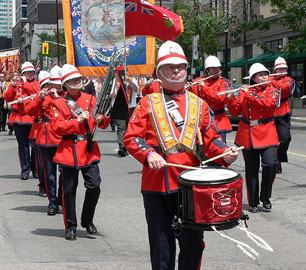
Believe it or not, even today Toronto still has an Orange Parade. This photo was taken on July 15, 2006.
For the most part, the over-aggressively British Protestant “Orangemen” in Canada were “the storm troopers of the Tories.” But there was also a kind of supplementary CCF/NDP political connection, linked to the Orange Order’s secondary representation of at least some working class interests. Just one biographical case in point is “William Donald Dennison (January 20, 1905 — May 2, 1981) … the last member of the Orange Order to serve as Mayor of Toronto, Canada. He held the office from 1966 to 1972, and was a long time member of Toronto City Council … Dennison was a member of the United Farmers of Ontario in the 1920s, and became a member of the Cooperative Commonwealth Federation and its successor, the New Democratic Party. He was a CCF candidate in the riding of Rosedale in the 1935 federal election, placing third.”
No federalist political party right now is altogether ready to get behind the inevitable Canadian republican future
Largely as a result of their surprising and dramatically unprecedented triumph in francophone Quebec this past May 2, 2011, the federal New Democrats are the new Harper Conservative majority government’s official opposition in the Canadian House of Commons.
Believing they are ultimately less formidable opponents than even the currently much chastened Liberal Party of Canada, the Conservatives are trying to treat the New Democrats as the only serious opposition they will be facing for the foreseeable future (even if the latest polls do not quite bear this prognostication out).
Who cares if Stephen Harper’s new Conservative Party of Canada is ultimately going to lose the domestic struggle it has somewhat surprisingly been reviving lately, over the fate of the British monarchy’s inevitably diminishing Canadian incarnation? Again, by that point, at least many of us alive right now will be dead – and Stephen Harper will almost certainly no longer be Prime Minister of Canada.
The practical political point is that, in the short to mid term, reviving such old (even if increasingly burnt-out) monarchist names as the Royal Canadian Navy (RCN) and Royal Canadian Air Force (RCAF) still does tend to divide the federal New Democrats. They are the official opposition in the Canadian House of Commons right now – and will be until 2015. “Divide and conquer” remains a potent short term strategy in Canadian federal politics, as elsewhere. It is in the short to mid term that elections are won – and lost. This does seem to be how the mind of Stephen Harper works. And at the moment who can deny that it is working well enough to remain Prime Minister of Canada, 2006—2015Â (and conceivably beyond)?
Moreover, it isn’t just the official opposition New Democrats whom Mr. Harper manages to divide and conquer with such new-old names as Royal Canadian Navy and Royal Canadian Air Force. As one notable Canadian republican who took the time and trouble to quiz the current leader of the Liberal Party of Canada on the matter late this past winter has reported: “I regret to inform you that Mr. Rae is not a republican … he dithered on about tradition and, pointlessly, mentioned that Sweden was also a constitutional monarchy. He muttered that when he swears the oath to the queen he’s actually swearing to Canada … Mr. Rae, a highly capable individual, playing a key role in our government, is inexplicably unwilling to direct his powers of rational deliberation to the issue of Canada’s ongoing attachment to the British monarchy.”
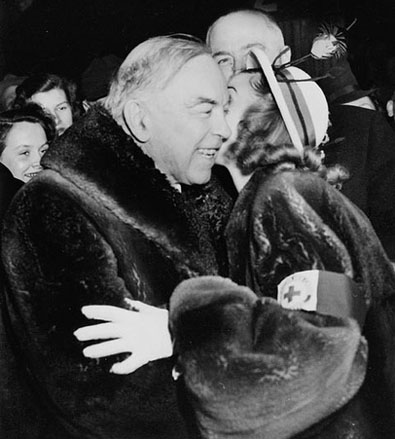
Prime Minister William Lyon Mackenzie King – dubbed “The Incredible Canadian” by journalist Bruce Hutchison – helps figure skater Barbara Ann Scott celebrate her 1948 gold medal at the Winter Olympics.
There have of course been and no doubt still are Canadian republicans in the Liberal Party of Canada. John Manley is only the probably best-known recent example. It is arguable that the essential thrust of the party’s history since the 19th century has been at least proto-republican. And in the 1920s, 1930s, and 1940s Liberal leader (and frequent Canadian prime minister) William Lyon Mackenzie King was the grandson of William Lyon Mackenzie, the quite unambiguous 19th century Canadian republican who led the Upper Canada Rebellion of 1837. Manley’s own ultimately faltering political career, however, just underlines the extent to which the federal Liberals are still not yet prepared to take on the long-term winning cause of some through-going Canadian constitutional modernization at last, within the framework of a new and stronger and more enduring Canadian republic – in which the diverse Canadian people are the ultimate and only democratic sovereign power, in practice and in theory too.
It is also part of the long-term strength of the current Canadian republican cause that Mr. Harper’s own new Conservative Party of Canada has more than a few republican partisans among its own adherents (despite the unique pro-monarchist clause in its party constitution). By all accounts, Preston Manning is one quite major case in point. But historically, as in so many other ways, saying “ready aye ready” to the cause of defending the British monarchy in Canada does remain an especially Conservative tradition. And by coming out so strongly in favour of carrying on with this tradition in the 21st century, Prime Minister Harper has almost certainly increased the chances that at last embracing the ultimately winning free and democratic cause of the independent Canadian republic will finally be part of the practical political formula by which his partisan opposition once again brings the Conservative party in Canada to its knees (a place it has so often occupied, after all, ever since the death of John A. Macdonald in 1891).
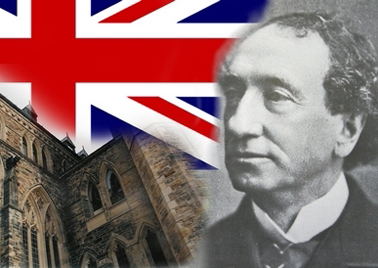 Meanwhile, PM Harper is nicely scoring some short term political points on both his main opponents in the Canadian House of Commons – keeping them divided and uneasy. One side of them would like to oppose him on such things as restoring the names of the Royal Canadian Navy and the Royal Canadian Air Force – because it knows that this is what ought to be done, in the best long-term interests of the diverse Canadian people. But another side still cannot quite do it, because (like the Conservatives themselves) neither the federal New Democrats nor the federal Liberals in Canada have themselves quite grown up. (And alas, I also feel I must agree, they are probably not very likely to do so quite as soon as the next Canadian federal election in 2015.)
Meanwhile, PM Harper is nicely scoring some short term political points on both his main opponents in the Canadian House of Commons – keeping them divided and uneasy. One side of them would like to oppose him on such things as restoring the names of the Royal Canadian Navy and the Royal Canadian Air Force – because it knows that this is what ought to be done, in the best long-term interests of the diverse Canadian people. But another side still cannot quite do it, because (like the Conservatives themselves) neither the federal New Democrats nor the federal Liberals in Canada have themselves quite grown up. (And alas, I also feel I must agree, they are probably not very likely to do so quite as soon as the next Canadian federal election in 2015.)
